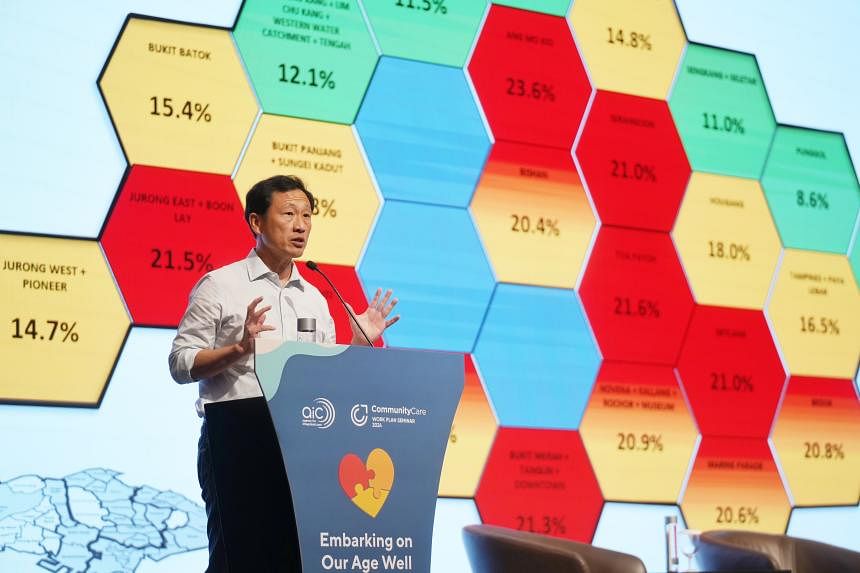SINGAPORE – When Health Minister Ong Ye Kung invites elderly residents in his ward to visit active ageing centres, “I will emphasise to them that everything is free and we will belanja (treat) them”.
“Their faces, without fail, will always light up. Perhaps at their age, and living alone, very few people invite them anywhere,” said Mr Ong on May 3, as he shared with community care workers how he engages with seniors living alone during his weekly home visits in Sembawang Central.
“One of my pet activities is communal dining. I believe that food has a great ability to bring people together,” he added. “I have been nagging our resident committees (RCs) to work with active ageing centres (AACs) to implement weekly communal dining at the void decks or RC centres, where it is very convenient for seniors to gather to prepare food and enjoy it together.”
Speaking at the Agency for Integrated Care (AIC) Community Care Work Plan Seminar 2024, he stressed the need for AACs to have better outreach, more interesting activities and stronger partnerships with community care groups to “take good care of our seniors” and keep them healthy and active.
Singapore is rapidly ageing, with one in four people set to be 65 and above by 2030.
But even before that – by 2026 – the island will be “super-aged”, which is when the proportion of the population aged 65 years and older reaches 21 per cent. In fact, seven of the island’s 24 regions are already there: Jurong East/Boon Lay, Clementi, Bukit Merah, Ang Mo Kio, Serangoon, Toa Payoh and Geylang.
Mr Ong said AIC will share data with AACs on where seniors are living, so that the centres can mobilise volunteers to knock on doors and befriend them.
There are currently 208 AACs, which are drop-in social recreational centres that extend support to seniors living nearby and provide them with the opportunity to build strong social connections, take part in various activities, and contribute to the community.
Mr Ong said one in five AACs has engaged more than 30 per cent of the seniors in their assigned populations, while about 50 per cent of the seniors do not visit these centres, as they are already engaged in community programmes or have their own social activities.
The number of seniors engaged and taking part in AAC activities each year has increased from about 17,000 in the 2021 financial year to more than 49,000 in 2022, and 2024’s engagement is expected to “far outstrip” 2022’s.
He also noted that many AAC activities are “going far beyond the stereotypical programmes”. NTUC Health AAC has robotics coding sessions, while Montfort Care’s Goodlife Studio in Bukit Purmei has carpentry and woodwork training, “which will help to attract more uncles”.
He said active ageing is not a new objective, as his ministry had implemented many programmes, “but none as comprehensive and far-reaching as Age Well SG”, a multi-ministry programme rolled out in 2023 that focuses on preventive care through measures that keep seniors active and social.
“(Age Well SG) is for the long term, covering all parts of the island, with deep intervention in communities, and will be well-resourced,” Mr Ong said, adding that his ministry will disburse about $100 million to the AACs in 2024, a significant jump from $60 million to 157 centres in 2023.
“We also need to get seniors to volunteer under the new national Silver Guardian programme,” he said, referring to an AIC initiative to get 2,400 seniors – called Silver Guardians – trained by 2028 in areas like befriending other seniors or organising activities at centres near their homes or workplaces.
The minister said AACs should also leverage and synergise efforts with other organisations that are already actively reaching out to seniors in the community, such as the People’s Association, Health Promotion Board, SportSG, religious organisations and interest groups.
“In that spirit, AACs should not have this ‘real estate’ mindset that all your activities must be in your AAC. Treat the entire estate as an asset that you can leverage and make use of all spaces in the community. Singapore has wonderful public spaces we can use that many other cities around the world do not have. Make use of void decks, fitness corners, coffee shops, parks, libraries and community clubs. Many activities that are held at those premises can be co-organised with other community partners.”
The number of seniors here aged 85 and above has risen by almost 80 per cent, from about 36,000 10 years ago to about 64,000 today – and these older seniors “will need a lot more support”, Mr Ong said. Sixty per cent of them are frail to severely frail, while about 70 to 80 per cent have hypertension and diabetes.
The Health Ministry’s job is “no longer sick care, but to help them recover and get back to their normal lives, after a bout of sickness”, he added. “We also need to help them remain well, active and healthy, leading dignified and meaningful lives.”
This is where AACs can incorporate “a higher tempo of health services” in their activities, tapping the Healthier SG network of general practitioners in the community, as well as the public hospitals.
“The DNA of this sector is... to do good together. We help one another as partners and friends,” Mr Ong said. “The relationships with the seniors and cooperation between providers are core to the success of the community care sector.”
As their needs change, seniors may move from senior care centres or day care, to requiring home care, nursing home care, or hospice and palliative care, and may be made to go through repeated care assessments at each stage.
To smoothen the process, AIC is rolling out a common tool to cut down on or get rid of repeated assessments. A common care plan will also be developed for each senior, who will have an assigned single point of contact to ensure information flows across all care providers within an area.
“Our seniors belong to the generations that built Singapore. They are our parents and grandparents. Most have already retired, and are in their golden years. They deserve to age with purpose and dignity,” Mr Ong said.
Correction note: In an earlier version of the story, we said “about 78 per cent have hypertension and diabetes” instead of “70 to 80 per cent”. We are sorry for the error.


